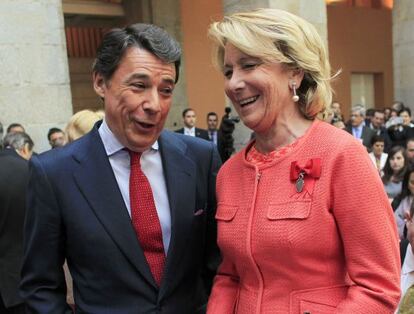Support slumps for ruling Popular Party in its Madrid region fiefdom
Poll shows PP would lose absolute majority if elections held now


If elections were held now, the ruling Popular Party would lose its absolute majority in the region of Madrid, its bastion of support in Spain, for the first time in 10 years.
At the same time, rather than advancing at the expense of the PP, the opposition Socialist Party (PSOE) would suffer its worst election result in the existence of the region. The main winners would be the United Left (IU) and the centrist UPyD party.
Those are the conclusions drawn from a poll conducted by market research group Metroscopia for EL PAÍS. The survey was conducted on April 29 and is based on interviews with 600 respondents.
The last time the combined left of the Socialist and the IU won a combined majority in regional elections in Madrid was May 2003. However, the then-PSOE Madrid leader Rafael Simancas was deprived of being named premier after two members of his party defected, leaving the premiership to PP regional leader Esperanza Aguirre.
An election now would end in a hung parliament, with the most-voted group requiring support to form a government
The Metroscopia poll showed that the PP would obtain only 35.2 percent of the vote if an election were held today, down 16.5 points from the 51.7 percent it garnered in elections in 2011. That would translate into 54 seats in the 129-seat regional assembly, down from 72 at present, constituting the group's worst showing since 1987.
Backing for the PSOE would drop by 6.1 percentage points to 20.1 percent, giving it 30 deputies, six fewer than at present. By contrast, the poll indicated that support for IU would almost double to 18.9 percent from 9.6 percent in 2011, with its number of seats in the assembly climbing to 29 from 16. That would constitute the group's best performance ever in the region.
The UPyD would also emerge strongly if regional elections were held now. The centrist group would win 10.4 percent of the popular vote, up from 6.3 percent in 2011, while its representation in the regional assembly would double to 16 seats from the eight obtained in 2011.
On the basis of that scenario, the election outcome would end in a hung parliament, with the most-voted group requiring the support of other party or parties in order to be able to form a government.
According to Metroscopia, the fall in support for the two main groups was due to the loss of party loyalists. Of regular PP voters, 57 percent said they would continue to support the party, but 20 percent said they would abstain if elections were held now.
On a personal level, PSOE Madrid leader Tomás Gómez came out worst in the poll, with a disapproval rating of 69 percent of all those surveyed and 59 percent among those who normally vote Socialist. Current premier Ignacio González had a disapproval rating of 65 percent.
Tu suscripción se está usando en otro dispositivo
¿Quieres añadir otro usuario a tu suscripción?
Si continúas leyendo en este dispositivo, no se podrá leer en el otro.
FlechaTu suscripción se está usando en otro dispositivo y solo puedes acceder a EL PAÍS desde un dispositivo a la vez.
Si quieres compartir tu cuenta, cambia tu suscripción a la modalidad Premium, así podrás añadir otro usuario. Cada uno accederá con su propia cuenta de email, lo que os permitirá personalizar vuestra experiencia en EL PAÍS.
¿Tienes una suscripción de empresa? Accede aquí para contratar más cuentas.
En el caso de no saber quién está usando tu cuenta, te recomendamos cambiar tu contraseña aquí.
Si decides continuar compartiendo tu cuenta, este mensaje se mostrará en tu dispositivo y en el de la otra persona que está usando tu cuenta de forma indefinida, afectando a tu experiencia de lectura. Puedes consultar aquí los términos y condiciones de la suscripción digital.








































